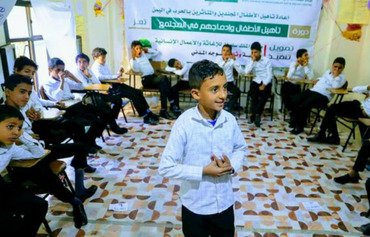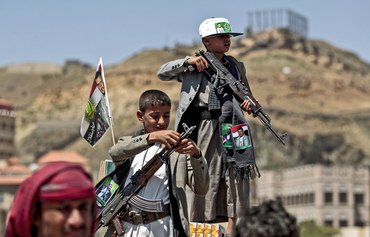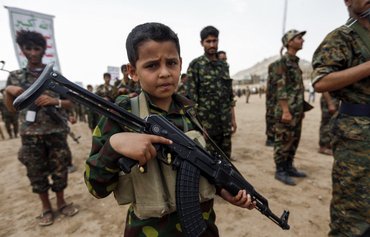Rehabilitation of child soldiers conscripted by Iran-backed Houthi militias (Ansarallah) and courses to help their parents cope with the reintegration process are continuing to see success, officials say.
The multi-phase programme is funded by the King Salman Humanitarian Aid and Relief Centre (KSRelief) and is being implemented by the Wethaq Foundation for Civil Orientation.
It aims to benefit 2,000 child soldiers and children scarred by Yemen's war, as well as their parents and family members.
Initially the programme focused on Marib, Amran, Taiz and al-Jawf provinces and then expanded to include Dhamar, Ibb, Hajja, Sanaa and al-Hodeidah.
![Houthi-recruited child soldiers undergoing rehabilitation in Yemen engage in a LEGO activity as part of a rehabilitation programme, sponsored by KSRelief, which aims to provide them with psychological relief and put them on the path of social reintegration. [Photo courtesy of the child soldiers rehabilitation programme]](/cnmi_am/images/2018/08/01/13700-Yemen-child-soldiers-600_384.jpg)
Houthi-recruited child soldiers undergoing rehabilitation in Yemen engage in a LEGO activity as part of a rehabilitation programme, sponsored by KSRelief, which aims to provide them with psychological relief and put them on the path of social reintegration. [Photo courtesy of the child soldiers rehabilitation programme]
![A rehabilitation programme funded by KSRelief offers diverse activities and classroom classes to children who were recruited by the Houthis as soldiers, in an effort to help them return to childhood and real life away from combat zones. [Photo courtesy of the child soldiers rehabilitation programme]](/cnmi_am/images/2018/08/01/13701-Yemen-rehabilitation-project-600_384.jpg)
A rehabilitation programme funded by KSRelief offers diverse activities and classroom classes to children who were recruited by the Houthis as soldiers, in an effort to help them return to childhood and real life away from combat zones. [Photo courtesy of the child soldiers rehabilitation programme]
The latest phase of the programme started on Thursday (July 26th) and aims to rehabilitate 80 children in Marib Province.
Before launching the new phase, KSRelief held a ceremony on July 22nd to celebrate the rehabilitation of 27 child soldiers.
The child soldiers "undergo psychological, social and cultural rehabilitation, and also attend school classes and engage in sport activities", Wethaq Foundation programme director Abdul-Rahman al-Qubati told Al-Mashareq.
"The rehabilitation process was not limited to child soldiers as it also included courses for parents on psychosocial skills for dealing with rehabilitated children to help them return to their normal lives," he said.
Twenty-seven parents participated in the course, which concluded July 14th.
"The parents received lectures on the dangers of child recruitment, the legal and moral responsibility, psychological means of supporting the children, integrating them into society, and protecting them from returning to the frontlines," al-Qubati said.
A return to childhood
"The programme's objective is to rehabilitate the child soldier psychologically and socially in order to return him to his normal life, wherein school would be the place for him to be to engage in his childhood hobbies and interests," programme media officer Ammar Zaabal said.
"The rehabilitation programme includes school classes and all kinds of sports to help the child soldiers get psychological relief and eliminate the negative tension they built up during the period of their conscription, in addition to other activities that are no less important, such as painting, art and theatre," he told Al-Mashareq.
The diversity of the activities aims to "return the child to childhood and real life, for his life is not in combat zones but in school, the playground and park".
"There are outdoor activities such as field trips to parks, recreational grounds or tourist attractions, and this is important for a child who has been deprived of such activities," he said.
"The children are in awe when they visit tourist attractions and step into another world," he said.
The post-rehabilitation phase
"Our task does not end with the completion of the rehabilitation phase," Zaabal said, expanding on the details of the post-rehabilitation phase.
"We continue to follow up on the children through the programme's co-ordinators, enroll them in school and [help them] overcome all the difficulties they may face outside the programme," he said.
The follow-up period lasts three to six months, and includes the submittal of monthly progress reports.
The reports indicate the extent to which the rehabilitated child soldier has accepted his new situation, or whether he had a setback in the post-rehabilitation period, Zaabal said.
Human rights activist Abdul Rahman Berman called on the rehabilitation programme to "document the violations the children were subjected to during their conscription".
"Violations against child soldiers have not been documented and the Houthi militias did not allow [human rights] organisations or activists to do their work in this regard in the areas under their control," he told Al-Mashareq.

![A programme to psychologically and socially rehabilitate child soldiers recruited by the Houthis in order to return them to their normal life has recently graduated 27 children in Marib province. [Photo courtesy of the child soldiers rehabilitation programme]](/cnmi_am/images/2018/08/01/13699-Yemen-rehab-children-600_384.jpg)






